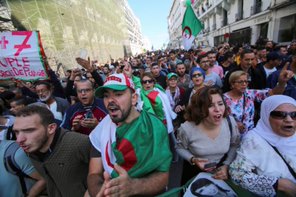On 26 November, the European Parliament adopted an urgency resolution highlighting “The deteriorating human rights situation in Algeria, in particular the case of journalist Khaled Drareni”. Mr Drareni was sentenced to two years in prison on 15 September 2020. Proposed by six out of the seven political groups, the resolution signals a broad agreement across the political spectrum. The undersigned national and international civil society organisations consider its adoption to be a timely and much needed step to address the escalating crackdown on civil society, peaceful activists, artists, journalists, and the independence of the judiciary.
The adopted text recalls the EP’s urgency resolution from 28 November 2019 on the situation of civic freedoms in Algeria, and expresses solidarity with “all Algerian citizens – women and men, from diverse geographic, socioeconomic and ethnic backgrounds – who have been peacefully demonstrating since February 2019”. It highlights that “in 2020 women’s rights movements have intensified in their denunciation of the increasing violence against women” and have called for “the review of existing laws in order to guarantee full equality.”
Journalist Khaled Drareni – whose case is highlighted by the resolution – has become a symbol of press freedom in Algeria. His harassment by the Algerian authorities and his sentencing to two years in prison is emblematic of the heightened repression. Condemning the escalation of arbitrary arrests and detentions, the European Parliament resolution calls on the authorities “to immediately and unconditionally release Mohamed Khaled Drareni and all those detained and charged for exercising their right to freedom of expression, both online and offline, and to freedom of assembly and association, including Yacine Mebarki, Abdallah Benaoum, Mohamed Tadjadit, Abdelhamid Amine, Abdelkrim Zeghileche, Walid Kechida, Brahim Laalami, Aissa Chouha, Zoheir Kaddam, Walid Nekkiche, Nourredine Khimoud, Hakim Addad.” The Parliament also “reiterates the call of UN High Commissioner for Human Rights, Michelle Bachelet, to urgently release all political prisoners and those detained for expressing dissenting views in light of the COVID-19 pandemic.” Finally, it “calls on the Algerian authorities to unblock media outlets and to halt the arrest and detention of political activists, journalists, and human rights defenders, as well as any person who expresses dissent or criticism of the government.”
The European Parliament also addresses the EU institutions and Member States, calling on them “to support civil society groups, human rights defenders, journalists and protesters, including by adopting a more assertive public position on the respect for human rights and the rule of law in Algeria, by clearly and publicly condemning human rights violations, by urging authorities to release arbitrary detainees and to stop the excessive use of pre-trial detention, by requesting access to detainees and monitoring trials of activists, journalists and human rights defenders, and by closely monitoring the human rights situation in Algeria”.
Under Articles 3.5 and 21.1 of the Treaty of European Union and Article 2 of the EU-Algeria Association Agreement, the EU and its Member States are to place human rights, including respect for international human rights conventions, at the centre of their collective and bilateral cooperation with Algeria. This includes the ICCPR, of which articles 14, 19, 21 and 22 are applicable to the human rights issues discussed in the resolution. The European Parliament states that it “expects the EU to place the situation of human rights at the heart of its engagement with the Algerian authorities, notably during the forthcoming EU-Algeria Association Council; presses the EEAS [European External Action Service] to draw up and deliver a list of individual cases of particular concern, including those mentioned in this resolution, and to regularly report back to Parliament on progress towards resolving these cases.”
The adoption of this resolution also follows the recent top-down amendments of the Constitution, in a process which has been criticized for its lack of transparency and inclusivity. The amendments dangerously maintain the domination of the executive branch over all institutions, including the judiciary, preserve harmful restrictions on rights and freedoms, and prevent effective independent oversight over the military and security forces. In that regard, the European Parliament “calls on the Algerian authorities to ensure both full accountability and civilian and democratic oversight of the armed forces, and their effective subordination to a legally constituted civilian authority, and to guarantee that the role of the military is adequately defined in the Constitution and expressly limited to matters of national defence.”
Amidst this rapid deterioration of civic space and fundamental freedoms, collective public action from the international community is needed to protect the rights and freedoms of Algerian citizens, including the right to participate freely in the public life of their country.
Signatory organisations
- Cairo Institute for Human Rights Studies (CIHRS)
- Collective of the Families of the Disappeared in Algeria (CFDA)
- Riposte Internationale
- International Federation for Human Rights (FIDH)
- CIVICUS: World Alliance for Citizen Participation
- Amnesty International
- Article 19
- Human Rights Watch
- Reporters Without Borders
- Cartooning for Peace
- SNAPAP (Autonomous Union of Public Administration Personnel)
- SESS (Solidarity Union of Higher Education Teachers)
- Algerian League for the Defense of Human Rights
- Euro-Mediterranean Solidarity Forum (FORSEM)
- EuroMed Rights
- Action for Change and Democracy in Algeria (ACDA)

